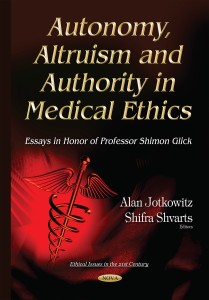
Autonomy, Altruism and Authority in Medical Ethics: Essays in Honor of Professor Shimon Glick
$2.00
Category: General Internal Medicine
published date: 10 Mar 15
by Alan Jotkowitz and Shifra Shvarts (Faculty of Health Sciences, Ben Gurion University of the Negev, Israel)
In this volume, written in honor of the eightieth birthday of Professor Shimon Glick, world renowned experts in the field of medical ethics struggle with the question of how to weigh the respective values of autonomy, altruism and authority in dealing with real life bioethical dilemmas. Professor A. Mark Clarfield addresses the issue of non-maleficence as it applies to the elderly, frail patient using the examples of screening for prostate cancer and Alzheimer's disease. Professor Cohen-Almagor chronicles his difficulties in researching and publishing his work on euthanasia in the Netherlands and the lessons he learned from these experiences. Professor Raanan Gillon respectfully argues against the contention that there is a moral difference between withdrawing and withholding therapy. Professor Michael Gross skillfully reviews the arguments for and against force feeding political hunger strikers ultimately concluding that, "force feeding should be rare and only come when attempts at reasonable accommodation fail." Professor Jonathan Halevy addresses the frequently overlooked ethical dilemmas facing a hospital director which have become more frequent in this era of resource driven medicine. He focuses on questions of risk management, triage, physician impairment, allocation of scarce resources and patient autonomy. Professors Kopelman and Appelbaum discuss the important issue of the impact of social media on the contemporary practice of medicine and the potential ethical challenges that this often brings. Issues such as confidentially and appropriate boundaries and their impact on the doctor-patient relationship are addressed in the context of social media. In telling the story of the death of his father and mother in law, Professor John Lantos demonstrates the complexity of each individual case and the difficulty of relying simply on ethical principles to resolve moral dilemmas in the hospital. In responding to Professor Lantos, Professor Alan Jotkowitz points out those Jewish ethical deciders who also realize the difficulties of a principle based approach and therefore use an insightful reading of Talmudic narratives to develop an authentic Jewish ethic. Professor Shifra Shvarts,Dr. Ofra Golan and Dr. Giora Kaplan trace the fascinating roots of the concepts of justice and equality in the Israeli healthcare system. They tell the intriguing story of how these concepts have evolved through the use of case histories from Jerusalem hospitals in the nineteenth century and the development of the early Sick Funds at the beginning of the twentieth century in Israel. Professor Avraham Steinberg addresses the question of how Jewish law defines basic concepts such as motherhood, fatherhood and a human being in light of modern science. Professor Alfred Tauber convincingly argues that opposition to physician strikes is rooted in the concept of what it means to be a physician. In Tauber's words "to enjoy the doctor status required not only an enormous fund of knowledge and professional commitment, one also accepted a deep personal responsibility for the care of the patient". Professor Paul Root Wolpe points out that the conceptual category of autonomy has become the dominant principle of Western bioethics, a development which he has labeled "the triumph of autonomy". The above notwithstanding, it is becoming increasingly apparent that placing autonomy at the top of one's hierarchy of values alone cannot solve all modern bioethical dilemmas. (Imprint: Nova)
Table of Contents:
Preface
Chapter 1. Unintended Maleficence in the Frail Elderly Patient. Are We Sometimes Complicit?
(A. Mark Clarfield, Sidonie Hecht Professor of Geriatrics, Ben-Gurion University of the Negev, Israel)
Chapter 2. Medical Ethics and Academic Freedom – My Dutch Experience
(Raphael Cohen-Almagor, The Middle East Study Group, University of Hull, UK)
Chapter 3. An Argument about Withdrawing Life-Prolonging Treatment
(Raanan Gillon, Imperial College London, UK)
Chapter 4. Sanctity of Life and the Right to Life: Force Feeding Hunger Strikers
(Michael L. Gross, The University of Haifa, Israel)
Chapter 5. Moral Duties and Ethical Dilemmas of a Hospital Director
(Jonathan Halevy, Shaare Zedek Medical Center, Jerusalem, Israel)
Chapter 6. Social Media and Medicine: Ethical and Practical Challenges
(Andrew Kopelman, Paul S. Appelbaum and Elizabeth K. Dollard, New York University School of Medicine and Bellevue Hospital, and Columbia University and New York State Psychiatric Institute, New York, NY)
Chapter 7. A DNR for Dad
(John Lantos, Professor of Pediatrics at University of Missouri – Kansas City and Director of the Children’s Mercy Hospital Bioethics Center, MO, US)
Chapter 8. Stories: A Response to John Lantos
(Alan Jotkowitz, the Jakobovits Center for Jewish Medical Ethics, and the Medical School for International Health, Ben-Gurion University of the Negev, Israel)
Chapter 9. “Separate and Equal”: The Historical Roots of Principles of Equality and Mutual Assistance in the Israeli Health System.
(Shifra Shvarts, Ofra Golan and Giora Kaplan, Moshe Prywes Center of Medical Education, Faculty of Health Sciences, Ben Gurion University of the Negev, Israel and others)
Chapter 10. Definitions of Basic Concepts, in Light of Modern Scientific Advances
(Avraham Steinberg, Shaare Zedek Medical Center, Jerusalem, Israel; Head of Editorial Board, Talmudic Encyclopedia, Jerusalem, Israel)
Chapter 11. Concerning Physician Identity and the Ethics of Care
(Alfred I. Tauber and Zoltan Kohn, Center for Philosophy and History of Science, TX, US)
Chapter 12. Triumph or Tyranny? A Reflection on Shimon Glick and the Concept of Autonomy in Bioethics
(Paul Root Wolpe, Asa Griggs Candler and Raymond Schinazi, The Center for Ethics at Emory University, GA, US)
Product Details
- Hardcover: 276 pages
- Publisher: Nova Science Publishers Inc (January 1, 2015)
- ISBN-10: 1634636481
- ISBN-13: 978-1634636483
DETAILS
-
Publisher
-
Language
-
ISBN1634636481, 978-1634636483, 9781634636483
-
Category
